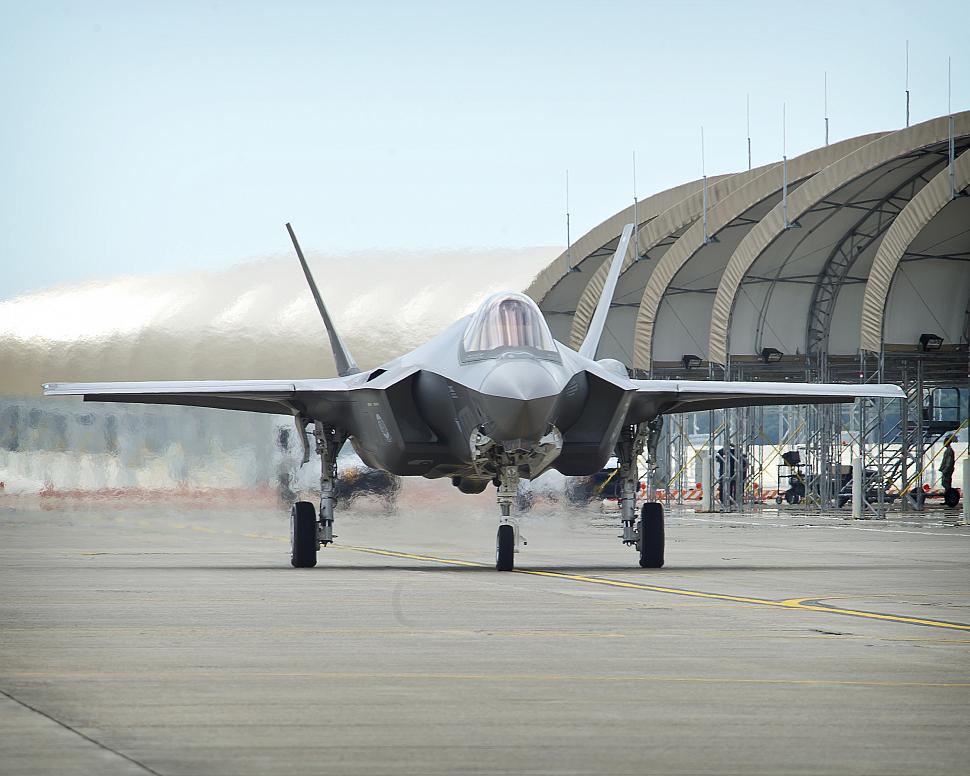Fighter Jet News
F-35 Lightning II News
All 51 F-35s cleared to resume flight operations
March 1, 2013 (by
Lieven Dewitte) -
The Pentagon will resume flights of its F-35 Joint Strike Fighter jets, which were grounded a week ago after a crack was discovered in a low-pressure turbine blade of an engine in one F-35 at Edwards AFB.
The Pentagon's F-35 program office decided to lift a temporary suspension of flight operations after it conducted extensive tests on the affected engine part. All 51 planes have been cleared to resume flight operations.
It was determined that prolonged exposure to high levels of heat and other unspecific "stressors" were determined to be the cause of the 0.6 inch crack rather than a design flaw. No additional cracks were found during inspections of engines on the remaining 50 planes in the Pentagon's fleet, or any spare engines, Pentagon spokeswoman Kyra Hawn said in a statement.
Pratt, a unit of United Technologies Corp that supplies the engines, had been working around the clock with Pentagon officials to determine the cause of the crack in the engine blade.
Matthew Bates, a spokesman for engine manufacturer Pratt & Whitney said the engine in question had operated at high temperatures more than four times longer than a typical F-35 flight, which led to a separation of the "grain boundary" of this particular blade.
"The engine in question was part of the F-35 test aircraft fleet and had been operated for extended time in the high-temperature environment in its mission to expand the F-35 flight envelope." Joe DellaVedova, a spokesman for Program Office said.
The Pentagon announced the grounding of all F-35 warplanes almost a week ago after an inspection revealed a crack on a turbine blade in the jet engine of an F-35 being tested at Edwards Air Force Base in California.
It was the second engine-related grounding in two months of the F-35 Joint Strike Fighter, the Pentagon's largest weapons program which costs nearly $400bn.
The Marine Corps variant (F-35B), a short take-off and vertical landing variant (STOVL), was grounded for nearly a month after a manufacturing defect caused a fuel line to detach just before a training flight in January.
It was determined that prolonged exposure to high levels of heat and other unspecific "stressors" were determined to be the cause of the 0.6 inch crack rather than a design flaw. No additional cracks were found during inspections of engines on the remaining 50 planes in the Pentagon's fleet, or any spare engines, Pentagon spokeswoman Kyra Hawn said in a statement.
Pratt, a unit of United Technologies Corp that supplies the engines, had been working around the clock with Pentagon officials to determine the cause of the crack in the engine blade.
Matthew Bates, a spokesman for engine manufacturer Pratt & Whitney said the engine in question had operated at high temperatures more than four times longer than a typical F-35 flight, which led to a separation of the "grain boundary" of this particular blade.
"The engine in question was part of the F-35 test aircraft fleet and had been operated for extended time in the high-temperature environment in its mission to expand the F-35 flight envelope." Joe DellaVedova, a spokesman for Program Office said.
The Pentagon announced the grounding of all F-35 warplanes almost a week ago after an inspection revealed a crack on a turbine blade in the jet engine of an F-35 being tested at Edwards Air Force Base in California.
It was the second engine-related grounding in two months of the F-35 Joint Strike Fighter, the Pentagon's largest weapons program which costs nearly $400bn.
The Marine Corps variant (F-35B), a short take-off and vertical landing variant (STOVL), was grounded for nearly a month after a manufacturing defect caused a fuel line to detach just before a training flight in January.
Related articles:
Forum discussion:
Tags
- Pentagon grounds entire Joint Strike Fighter fleet ( 2013-02-22)
- F-35 'pushes the envelope' ( 2012-12-20)
- F-35 Lightning II news archive
Forum discussion:
- F-35 to return to flight after grounding ( 22 replies)
Tags

